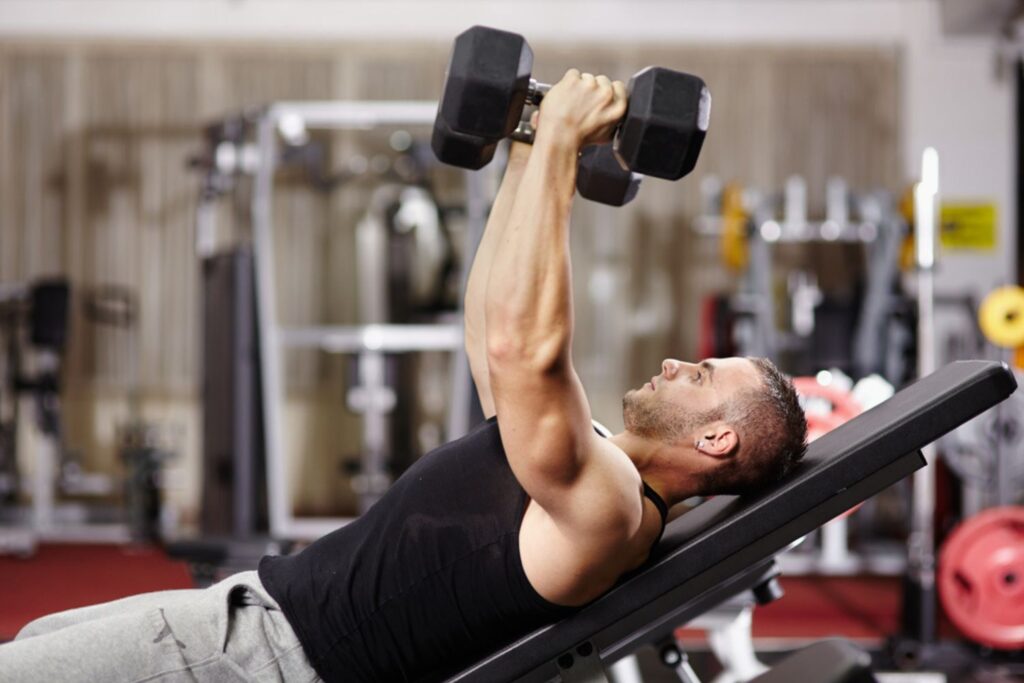THE BENCH PRESS HAS long been used as an indicator of overall strength. Whether you’ve just joined a gym or have long been an acolyte of iron, chances are the bench press is an integral component of your workout routine and you’re likely using it as a benchmark to measure your progress. But is there an actual standard you should be aiming for? Some will insist that to be considered strong, you should be able to bench at least your own bodyweight. Others will peg their entire self-worth on being able to bench two plates (or 100kg). Neither are correct.
There’s something about bench press that makes improving a PB so appealing. For one, bench press targets multiple muscle groups, meaning you can really use your full strength to lift as heavy as possible. Big numbers are why gym-goers do what they do. Sure, a 50kg barbell curl may be more impressive than a 100kg bench press, but hitting triple digits on anything is bound to feel good. So, how much should you be benching before you can brag about it?
How much should you bench press?
At the end of the day, the bench press is not the greatest indicator of overall strength. People come in all shapes and sizes. Therefore, what represents a solid bench-press weight will be different for everyone. Someone that weighs 60kg will have different standards than someone that weighs 90kg. Even if you consider the ‘bench as much as your body weight’ mantra as a reliable standard, you’re failing to take into consideration factors like body composition, muscle mass and general experience in lifting weights. Something like the push-up, which evens the playing field as a bodyweight exercise, is a far superior indicator of strength and fitness.
With all that being said, there are a few standards you can hold yourself too when it comes to the bench press. The most reliable measures take into account experience as well as strength focus—because powerlifters and calisthenics devotees should have vastly different expectations.
Let’s say you’re new to the gym. It’s unreasonable to expect yourself to bench your full bodyweight on your first attempt, but benching around half your body weight is far more reasonable. This number should steadily increase as you make progress, and after around a year of training, benching your body weight should be more manageable. After three years, bench pressing 1.5 times your bodyweight is a solid goal. For what it’s worth, tennis icon, the barrel-chested Andre Agassi, recently told Men’s Health his all-time bench press PB was 142kg, not bad for a guy whose playing weight was around 80kg. It’s worth noting that these figures aren’t non-negotiable, and even after years of training, your PB might still be well under two plates (100kg). Not everyone needs to hit that weight to be considered strong.
How can you improve your bench press?
There’s a fairly good chance that even if you’re satisfied with how much you can bench press after reading the above measures, you’re still looking to lift heavier, push harder and get even stronger. To accomplish this, here’s a few ways you can improve your bench press.
Perfect your form
First and foremost, mastering proper form is paramount. Ensure your back is firmly planted on the bench, with your feet flat on the ground. Maintain a natural arch in your lower back and grip the bar with hands slightly wider than shoulder-width apart. This positioning not only optimises power generation but also minimises the risk of injury. During the lift itself, use more than just your arms. Draw power from your chest, back and legs for maximum strength.
Focus on compound movements
Focusing on compound movements that target the muscles engaged in bench press will help you get stronger and improve your PBs. Incorporate exercises like push-ups, dips, and overhead presses into your routine to fortify your chest, shoulders, and triceps. A well-rounded approach to training will contribute to overall upper body strength and support your bench press progression.
Utilise progressive overload
Progressive overload is a key principle in strength training. By gradually increasing the weight you lift over time, muscle growth can be stimulated. However, it’s crucial to strike a balance between challenging yourself and maintaining proper form. There’s no point in lifting too heavy and cranking out three half-reps that will have everyone around you questioning your know-how on the exercise. Consistency is key, so establish a structured workout routine and stick to it.
Don’t over do it, prioritise rest and recovery
Don’t neglect the importance of rest and recovery. Adequate sleep, nutrition, and targeted stretching can significantly impact your bench press gains. Muscles need time to repair and grow stronger, so ensure you allow for proper recovery periods between intense workouts.
Find some assistance
Seeking guidance from experienced lifters or certified trainers can be a game changer. Someone with experience can provide valuable feedback on your form and offer encouragement, while finding a spotter can deliver extra motivation and ensure your safety during heavy lifts.
How often should you do bench press?
A well-structured and balanced training regimen is the key to any successful gym journey. That includes knowing how often you should perform each exercise. While bench press frequency varies based on individual goals, fitness levels, and how often you hit the gym, it’s a good idea to include the bench press in your workout one to two times per week.
A once or twice a week frequency allows for adequate stimulation of the chest, shoulders, and triceps while allowing sufficient time for recovery. Finding the right balance here is essential. Always make sure you’re prioritising intensity, proper form, and progressive overload over excessive frequency.

Getty Images
Related:
















